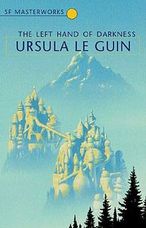Ursula Le Guin and the Drake Equation
 While I read Ursula Le Guin’s The Left Hand of Darkness a couple of weeks ago, news broke of the latest estimate of the number of Earth-sized, theoretically habitable planets in our galaxy. In a paper published in the Proceedings of the National Academy of Sciences (Petigura, et al) based on data reported by NASA’s Kepler mission, astronomical scientists calculate that 22 percent of Sun-like stars in our galaxy are orbited by Earth-sized planets in the so-called “habitable-zone.” Given the number of stars thought to be suitable hosts, there could be as many as 40 billion rocky planets in our galaxy alone positioned in “Goldilocks zones” like that which we here on our rocky planet find ourselves.[1]
While I read Ursula Le Guin’s The Left Hand of Darkness a couple of weeks ago, news broke of the latest estimate of the number of Earth-sized, theoretically habitable planets in our galaxy. In a paper published in the Proceedings of the National Academy of Sciences (Petigura, et al) based on data reported by NASA’s Kepler mission, astronomical scientists calculate that 22 percent of Sun-like stars in our galaxy are orbited by Earth-sized planets in the so-called “habitable-zone.” Given the number of stars thought to be suitable hosts, there could be as many as 40 billion rocky planets in our galaxy alone positioned in “Goldilocks zones” like that which we here on our rocky planet find ourselves.[1]
Drake’s equation comes to mind, but first, the book …
The Left Hand of Darkness
I only quite recently acquainted myself with the fiction of Ursula Le Guin. The two novels serving as my introduction belong to what is popularly known as her “Hainish Cycle” (The Dispossessed was the other).[2] In these novels, humanity first rose on the planet Hain and was exported from it to other worlds. After hundreds of thousands of years (I am supposing) of divergent evolution, these far-flung populations of humans differ significantly while yet exhibiting obvious kinship. As many as 80 of these worlds in a small corner of our galaxy belong to the Ekumen federation.
Ursula Le Guin’s The Left Hand of Darkness is listed at #5 on Bachblog’s 45 Great 20th Century SciFi/Fantasy Novels. It was first published in 1969.
Le Guin’s federation seems entirely devoid of intergalactic war. Granted, I have read only two of the seven novels that make up the cycle, but both hint that such long-distance combat is impractical (space travel approaches but does not exceed the speed of light) and, it seems, contrary to the sensibilities of the worlds sufficiently advanced to wage it. Hers is not the galaxy of Star Wars or Star Trek. Human sociology is of interest to her, not futuristic technology or interstellar conflict. Intra-planet conflicts do occur just as they do here on Earth, though on this novel’s planet, at least, conflict between nations is decidedly low-key.
Genly, the Terrean narrator of Darkness and envoy to the planet Gethen, hails from an evidently kinder and gentler future version of our planet.) The human inhabitants of Gethen are androgynous; each individual both male and female.[3] That all share female as well as male traits may contribute to its relatively (but not completely) non-aggressive society. The planet has never seen war, though it is unclear whether its brutal ice-age conditions or the feminine aspects of its inhabitants are responsible for this.
It is asserted that Le Guin writes “feminist sci-fi” and that this novel in particular is an example. I don’t know about all that and don’t really care. She creates interesting worlds and I am a sucker for a series. Who doesn’t enjoy revisiting favorite people and places? More Hainish worlds please!
Drake’s equation: N = R* • fp • ne • fl • fi • fc • L
As King Solomon once threatened to do—having dozens or hundreds of wives would cause anyone to lash out in unpredictable ways—I have cleaved this baby in twain. To read more about Drake’s intriguing formula, see The Drake Equation (inspired by Le Guin).
—
Notes
- A PDF copy of the full paper is freely available: “Prevalence of Earth-size planets orbiting Sun-like stars”. [^]
- In a bibliography published on her own website, these novels are referred to as the “Novels of the Ekumen” not the “Hainish Cycle,” but the latter is more frequently used to describe them. Le Guin reportedly prefers not to think of the books as a “cycle” in any case. I suppose no one would call the novels of Sinclair Lewis set in the fictional Midwest city of Zenith as a “cycle.” It may be a term more often used of works in the sci-fi genre, and may in her mind—I’m freely speculating here—have the taint of marginality. [^]
- It’s complicated! [^]
| DATE | TITLE |
| 12/09/2019 | Books 2019: #2 Dozen Really Matter? |
| 05/20/2019 | Why Not Both? |
| 04/23/2019 | Books 2019: #1 Take Ten |
| 04/15/2019 | Books 2018: #31 - #37 |
| see also ... | 113 Great 20th Century Novels |
| 46 Great 20th Century Crime Novels | |
| 45+ Great 20th Century SciFi/Fantasy Novels | |
| Books Read (2008-) | |
| Index of Book Posts |
